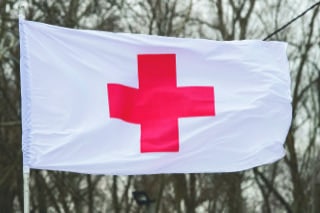
The World Health Organization (WHO) has published an interim report on its response to the Ukraine crisis, detailing the ‘unprecedented’ mobilisation and crisis response between February and June 2022 by WHO and the organisation’s partners.
The conflict has increased the need for healthcare while reducing the system’s ability to provide services, particularly in areas of active conflict.
With a clear focus on ‘sustaining life-saving services, no matter what’, WHO and its partners have sought to respond to urgent medical requests as a direct consequence of the conflict, while also maintaining the continuity of care for life-threatening and chronic conditions.
In response to the need for continued access to treatment, pharma companies have offered aid through direct financial support, as well as the supply of life-saving medicines. The Association of the British Pharmaceutical Industry (ABPI) has detailed the response of its member companies offering humanitarian support both in Ukraine and for the emerging refugee crisis in neighbouring countries.
In Sanofi’s May update on its response to the Ukraine crisis, the company announced that its philanthropy arm, ‘Foundation S – The Sanofi Collective’, had made over €21m worth of essential medicine and vaccine donations to the Red Cross. This included 30 million daily treatments for diabetes, cardiovascular disease, epilepsy and other life-threatening and chronic conditions. The company has also donated over 300,000 diphtheria and tetanus vaccines.
According to the International Diabetes Federation, there are over 2.3 million people with diabetes in the Ukraine, making up 7.1% of the population. Eli Lilly’s supply of medicines, including over two million doses of diabetes and cancer products have made their way to hospitals and patients in Ukraine via the company’s humanitarian partners. Its most significant supply of medicines includes insulin, with more than 117,000 vials and pens delivered to humanitarian aid organisations Direct Relief and Project HOPE. The company also said in an update that it had sent a supply of its COVID-19 therapies to Ukraine, along with two additional supplies of diabetes and cancer products to Direct Relief.
Pharma has also been responding to the need for HIV treatment. Ukraine has the second- highest number of HIV cases in Eastern Europe and Central Asia, according to Joint United Nations Programme on HIV/AIDS (UNAIDS). To meet the needs of this population, through ViiV Healthcare, GSK has been making significant donations of antiretroviral medicines available to WHO, national AIDS programmes and NGO partners to support children and adults living with HIV who have been impacted by the conflict. Gilead Sciences has also been working to address the needs of Ukrainian refugees with HIV.
The continued access to oncology treatments has also been an area of focus in order to avoid life-threatening disruptions to patients’ cancer care. Ukraine has a high cancer burden, with more than 160,000 new diagnoses in 2020 alone. Pharma companies have been delivering oncology treatments in an effort to meet this need. Novartis, for example, announced in June that it had delivered over $33m worth of medical aid, which included oncology treatments, as well as antibiotics, painkillers and cardiovascular treatments. In its initial statement, Pfizer also announced that it would donate medicines and vaccines from both its existing supply in Ukraine and from the US, including nearly 700,000 doses of oncology medicines, antibiotics and antifibrinolytics.
As well as maintaining the continuity of care, pharma has also responded to urgent medical requests caused by the conflict. With the help of WHO, Roche has shipped packs of antibiotics and batches of anaemia treatment to Poland and Ukraine. The company has also responded to the increased need for blood and blood products, sending thousands of reagents and consumables for automatic testing of blood samples to the Ukrainian Ministry of Health, which were distributed to 17 sites across the country to ensure patients do not receive contaminated transfusions.
Some companies have also taken a different approach to support Ukraine. Honouring the biopharma sector’s historical exemption from economic sanctions and an obligation to deliver life-saving medicines, regardless of circumstances, Pfizer announced that it would donate the equivalent of all profits from Russian sales to causes that provide direct humanitarian support to Ukraine, with the company announcing in June that it would ‘make good’ on this promise, with AbbVie announcing its intentions in April.




